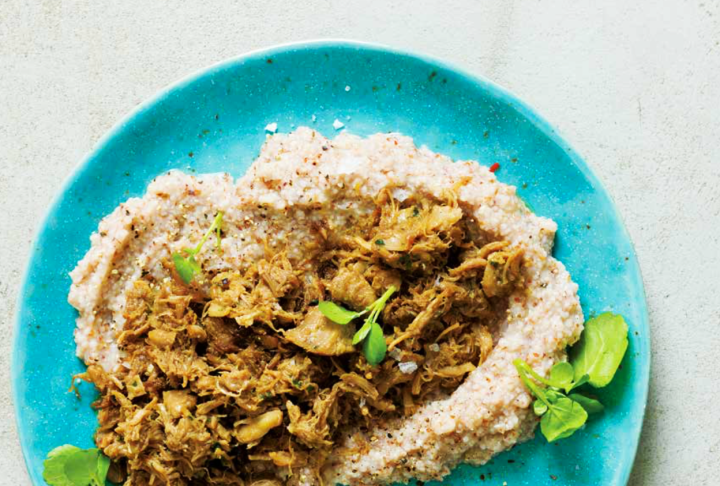SCOFF
The case for a nationwide funeral feast

The excruciating experience of losing a loved one to Covid-19 has been made much worse by our inability to come together to prepare and share food.
The author supports The Lunchbox Fund, transforming South African education a school meal at a time.
Is there anything more awful than a Zoom funeral? Well, yes actually, dying from Covid-19 caught at an unauthorised, overcrowded gathering is far worse. Which is why the aforementioned virtual sendoffs are an essential part of our current protection against pandemic.
Over the past year, South Africans have had to reconfigure and reduce the number of mourners physically present at our sacred and secular remembrance rituals. Understanding and accepting the need for video conference burial and memorial services doesn’t diminish the desire to truly come together in grief. No matter how many crying emojis, #RIPS are sent, our support systems have been profoundly impaired by social distancing requirements. Try as we might, it is difficult to show up for someone emotionally without being present in person.
Most of all I miss funeral food. Not because I am greedy (although I am) but because cooking and sharing food so clearly communicates communal caring and carrying on. Food is the fuel of life. On our darkest days, it can offer a defiant assertion of faith in the future. And without that we have nothing.
South Africa has a wide variety of traditional funeral foods. These have hitherto not only been our go-to expressions of love and support for the bereaved but also declarations of respect for the deceased. Without food and drink, funerals feel unfinished. Reduced attendance means little or no ritualised food preparation. In many southern African culinary cultures, slaughtering of cattle is key to communication with ancestral realms but what would one do with masses of meat in the absence of a crowd? Smaller animals such as goats get the job done but as a mark of major life stage transition, the moment is muted. Cape Malay Qur’anic recitals on the third, seventh, 40th and 100th night after the death are religiously valid but can be achingly lonely affairs without the customary post reading voorkamer full of supportive friends and family sharing rose pink gedatmelk.
Above and beyond the pain of subdued spiritual practice many of us have also missed out on the small but healing secular culinary customs by which the living traditionally honour the dead. Burdens are best shared around three-legged pots of Tswana tšhotlho pulled beef and ting soured sorghum. Plates of wortel en ertjie kifyaat kos bring Cape Malay communities comfort in times of tragedy. Ndebele elders have lost endless opportunities to process pain as they reminisce on the morning after the funeral with amangqina trotters. Afrikaans aunties have been denied the reassuring rites ordinarily infused into turmeric, cinnamon, raisins, brown sugar and butter-laden begrafnis rys (funeral rice).
As we mark the pandemic’s first anniversary, there are Xhosa widows beginning ukukhululwa kwezila (to take off black mourning clothes) without in-person community acknowledgement. While most of us agree that it must be so, wounds that might otherwise be beginning to heal are left open and raw when societies do not come together to bear witness. How can we ever repay the deep diphaphata flatbread and bjala marole beer (which literally translates as beer for cleaning the dust) debt owed to Pedi grave diggers who have excavated endlessly without their usual edible and quaffable compensation? Without food and drink rituals our collective dust is not cleared and we cannot move on.
If and, please God, when the pandemic is finally over, I propose that we should commemorate and venerate lives lost and rituals curtailed with a national funeral feast. We all need to feel the weight of bucket loads of dikuku Sekhukhuneland scones as we conduct condolence visits. We are all longing for the supportive glow at the back of the throat that comes with gemere ginger beer at Xhosa night vigils and the love layered into begrafnis reënboog toebroodjies on Afrikaner sout bordjies (funeral rainbow sandwiches on savoury platters).
Let us look forward in hope to a time when we will connect with each other and our ancestors as we pass around a communal calabash of umqombothi Zulu traditional beer. The day is coming when we will be able to reach out without fear after funerals for roasted meat on shared ezenkeni metal sheets. Those giant pots of salt-free stew (with which so many South Africans traditionally symbolise their funereal sadness) will once again transform as they cook long and slow into robust, redemptive, savoury splendour. DM/TGIFood





 Become an Insider
Become an Insider
Thank you, Anna Trapido, for your beautiful, thoughtful and thought provoking reminder of what we are all missing, and above all for your wonderful suggestion of a national feast at the end of it all.